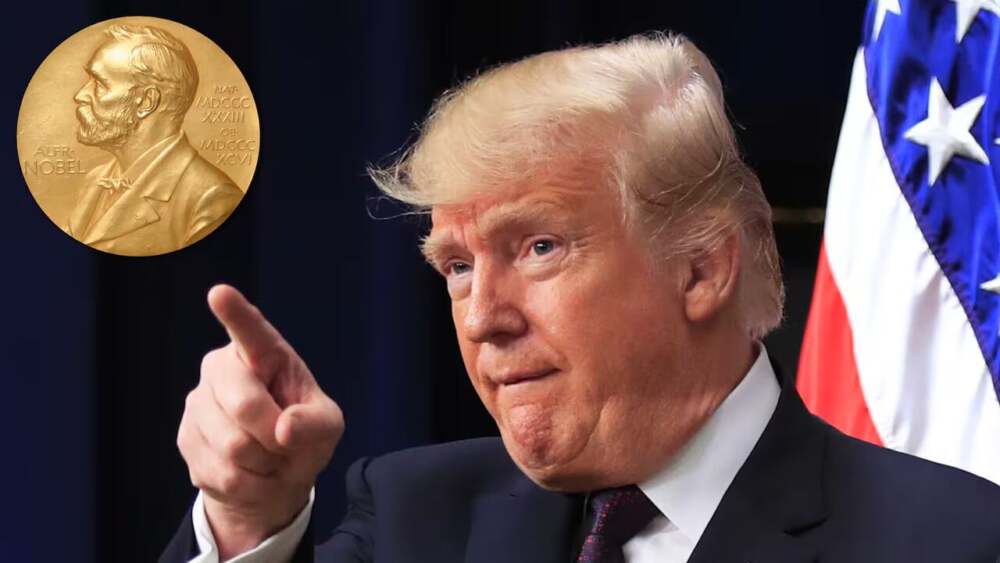Washington, October 10, 2025 — As the 2025 Nobel Peace Prize announcement looms, former and current U.S. President Donald Trump has mounted one of the most assertive and high-profile campaigns yet for the prestigious award. His maneuvering—both diplomatic and rhetorical—has sparked debate over what constitutes genuine peacebuilding, and whether ambition can ever coexist with true peacemaking.
A Prize Sought on the Global Stage
From early in his return to the White House, Trump has spoken openly about his desire to win the Nobel Peace Prize. He has tied major foreign policy initiatives to that goal, framing diplomatic moves as part of a broader legacy-building push.
Analysts note that Trump’s public diplomacy takes on a different tenor when tied to the Nobel. Deal announcements, ceasefire negotiations, and summits frequently coincide with media efforts to highlight his mediation role—or to suggest that the prize is a just reward for his interventions.
One recurring storyline is his involvement in the Israel-Hamas ceasefire and prisoner exchange, which was activated just as Nobel speculation intensified. Some observers believe the timing was influenced by the prize calendar, with negotiators aiming to clinch breakthroughs before the Nobel committee’s decision window.
Critics counter that these tactical pushes blur the line between strategic diplomacy and performative peace efforts. In some quarters, Trump’s diplomacy is seen as opportunistic, driven as much by the quest for recognition as by conflict resolution.
Nominations, Lobbying, and Obstacles
Trump has been nominated for the prize by several individuals and political actors, including foreign ministers and legislators who cite his efforts in brokering peace agreements across the Middle East and beyond. Yet his path is obstructed by several structural and reputational hurdles.
One key issue is timing: nomination windows for the Nobel close early each year, and many of his most prominent peace efforts—especially the ones after he reentered office—occurred after the deadline. That constrains how much weight recent diplomacy can carry in the current year’s selection.
Moreover, the Nobel Committee operates under a principle of discretion and relative insulation from political influence. While nominations are public in some cases, internal deliberations are meant to be shielded from media campaigns and pressure. The committee often weighs long-term impact, moral integrity, and consistency—criteria that critics argue Trump’s record sometimes undermines.
Another obstacle is public perception. A Washington Post–Ipsos poll in September found that 76 percent of Americans believed Trump did not deserve the Nobel Peace Prize this year. His divisive style, confrontational foreign policy, and polarizing domestic record contribute to skepticism about whether his peace efforts are enduring or substantive.
Diplomatic Levers and Pressure from Abroad
Trump’s Nobel ambitions have rippled into diplomacy itself. World leaders have occasionally responded to his campaign with both encouragement and caution. French President Emmanuel Macron, for example, publicly stated that if Trump truly wants the Nobel, he must prioritize stopping the Gaza war—essentially insisting that deliverables must follow ambitions, not vice versa.
In smaller capitals, some foreign figures have used Trump’s campaign as a diplomatic lever of their own. By nominating him or publicly lauding his mediation efforts, they effectively place pressure on Washington to follow through on peace promises—or risk reputational blowback.
Conversely, Norway and the Nobel Committee have signaled resistance to external influence. Committee members and advisors have repeatedly emphasized that lobbying and media blitzes do not govern the decision. Their mandate rests on adherence to Alfred Nobel’s original vision and thoughtful assessment of genuine peacebuilding.
When Momentum Meets Reality
Even though Trump’s campaign is bold, achieving results is another matter. In Gaza, the ceasefire deal includes complex terms about hostages, territorial control, and governance—each stage vulnerable to stalling or violation. Success in these areas will be closely watched as evidence of real impact.
Similarly, Trump has hinted at mediation roles in Ukraine and elsewhere, but critics say his follow-through has been uneven. Some negotiations fizzled before reaching tangible outcomes, raising doubts about whether the campaign is more spectacle than substance.
In essence, Trump’s bid for the Nobel is encountering the classic tension between symbolism and sustainability: can a peace gesture backed by media fanfare build enough institutional and political support to endure once the spotlight fades?
What the Nobel Committee Sees as the Test
The 2025 Nobel Peace Prize jury faces a challenging decision. Some will focus on emerging diplomacy in hotspots like Gaza and see Trump’s role as meaningful. Others will scrutinize his record for consistency—examining whether his peace overtures align with broader goals of human rights, conflict prevention, and durable resolution.
This year’s decision will inevitably be interpreted as a statement—not only about who wins the prize, but about the committee’s stance toward modern, media-savvy diplomacy. Do they reward spectacle with substance, or hold leaders to deeper standards than headlines?
After the Verdict: Legacy or Reprieve?
Whatever the outcome, Trump’s campaign has already reshaped expectations for how world leaders frame peace efforts. If he wins, it will validate a model of peace intertwined with personal narrative. If he loses, it may highlight the limits of ambition without lasting change.
As the announcement nears, global eyes will not only be on the laureate—but on how diplomacy, ambition, and legitimacy are being recalibrated in a world increasingly attuned to media power alongside moral authority.
















Leave a Reply